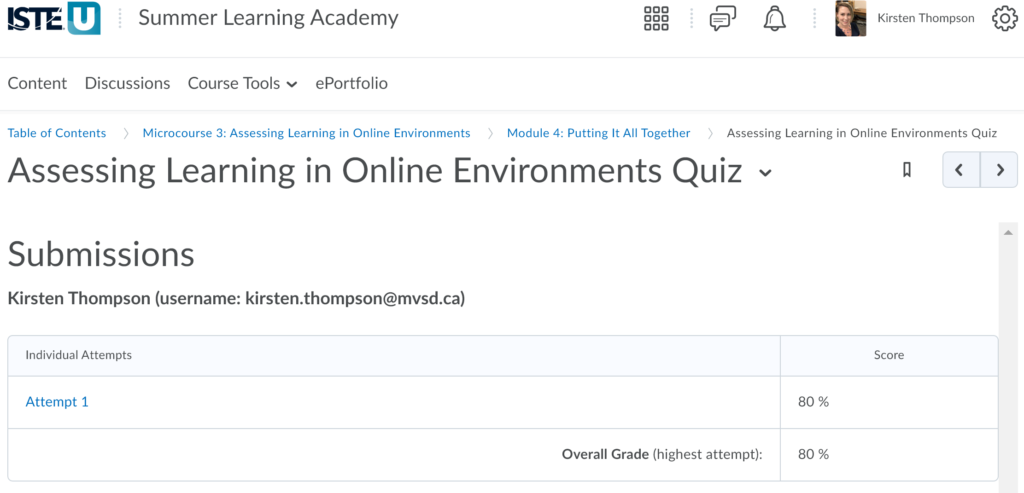Assessing Learning in Online Environments – #ISTEsla20 Microcourse #3
The following post has been completed as part of my personal reflection as I work through the ISTE Summer Learning Academy #ISTEsla20 Any images,tables, or direct quotes (as indicated with the appropriate formatting) are provided from the specific course or webinar and can be credited to: ISTE Summer Learning Academy. (2020). https://summerlearningacademy.iste.org/
“Assessments and feedback are critical components of online learning — for students and teachers alike. In this course, you will explore best practices for incorporating formative assessments into your online teaching. You will also learn to leverage digital tools to provide ongoing feedback and summative assessments.”
All resources for this course can be found HERE.
Module 1 – Formative Assessments in Online Learning
| Essential Question | Description |
| How can you design your digital lessons to provide opportunities for formative assessment, practice, and individualized instruction? | In this module, you will explore and practice four different types of formative assessment: interactive instructional content, reflection, discussions, and checks for understanding. |
Interactive instructional content includes:
- interactive videos
- stop and answer questions while watching video lessons
- can be done through tools like EdPuzzle, NearPod, or Playpostit
- games
- feedback is built into playing the game
- simulations
- actively engage with learning with computer-generated feedback
- can be done through tools like PhET, CK-12, PLIX, gooru, & adaptive practice
- adaptive software
Reflection tools include Padlet, Flipgrid, Jamboard, Paper & Pencil
Many LMS have multiple ways for students to engage in online discussion that can be used for formative assessment. The following strategies can guide these discussions:
- TQU: thoughts, questions, epiphanies
- Intitial content engagement: what do you already know about this
- Debates
- Fishbowls: half of the class participates in a discussion while the other half observes and summarizes, then switch
- Student generated: students come up with their own questions
- Convergent, divergent & evaluative
Module 2 – Providing Meaningful Feedback
| Essential Question | Description |
| How much of your feedback is actionable for students? When does the bulk of your feedback occur? | In this module, you will take a look at how you can provide high quality feedback in online environments that improves learning outcomes for students. |
Read more about How To Give Your Students Bette Feedback With Technology.
It continues to be recommended that you limit the amount of tools/apps/programs that you are using. Many LMS, including Teams, has native recording tools built into all platforms for feedback.
Module 3 – Optimizing Summative Assessments for the Online Environment
| Essential Question | Description |
| Are you designing summative assessments that can’t be “Googled?” What are the benefits and drawbacks of a competency-based approach? | In this module, you will explore different types of summative assessments and how they can be implemented in online environments. |
Traditional summative assessment often relies on text-based responses in the form of multiple-choice, short answer or written questions.
Performance summative assessment focuses on authentic practic skills that students demonstrate by performing an observable measurable task.
Check out, “Is This a Trick Question? A Short Guide to Writing Effective Test Questions“
You can read more about CBL HERE.
Module 4 – Putting It All Together
| Essential Question | Description |
| Can you connect your learning from this microcourse into your teaching practice? | In this module, wrap up the content and complete a final assessment. |
Microcourse 3 Quiz Results

Read all of the #ISTEsla20 posts:
- Microcourses
- Week 3
- Week 2
- Week 1
5 thoughts on “Assessing Learning in Online Environments – #ISTEsla20 Microcourse #3”